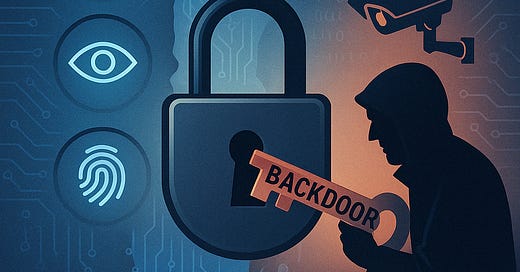Sweden’s Encryption Backdoor Push: Why the World Should Be Paying Attention
A heated proposal in Sweden could reshape how secure your messages really are
Why It’s Important
Sweden is advancing a bill that could force encrypted messaging platforms like Signal and WhatsApp to build backdoors—technical vulnerabilities that allow authorities to access user messages. If passed, this law wouldn’t just affect Sweden’s 10 million residents—it could set off a domino effect across democracies around the world, impacting the global future of digital privacy, encrypted communication, and civil liberties.
What It Is / How It Works
The proposed legislation, which could be considered by the Riksdag (Sweden's parliament) within the next year, would compel messaging platforms to retain communications data and grant the Swedish Security Service and police access to message histories of criminal suspects. This means Signal and WhatsApp would have to redesign their platforms to bypass or break end-to-end encryption—undermining the very system designed to keep communications private and secure.
Sweden’s Minister of Justice, Gunnar Strömmer, argues that such access is vital for combating organized crime and protecting national security. However, encryption experts and privacy advocates warn that backdoors are not selective—they can’t only be used by “the good guys.”
How to Mitigate It
For now, here’s how individuals and organizations can take steps to protect their privacy:
Diversify messaging tools: Consider decentralized, open-source platforms like Matrix or Session that are harder for centralized regulation to impact.
Use VPNs and self-hosted communication apps when possible to reduce reliance on centralized providers.
Stay informed: Follow updates from privacy-focused organizations like EFF, Privacy International, and Access Now.
Support advocacy groups lobbying against forced backdoor legislation by signing petitions and contributing to legal defense funds.
Encrypt locally: Store sensitive information using local encryption tools that never transmit data to the cloud.
How to configure/install or use, if applicable
If you're currently using apps like Signal or WhatsApp in Sweden—or any country considering similar laws—you can:
Enable disappearing messages on both apps to minimize stored data.
Use encrypted backups sparingly: If authorities gain access to cloud backups, they can bypass end-to-end encryption.
Switch to tools like ProtonMail for secure email, or Element (Matrix client) for messaging, which can be self-hosted and resist central backdoor mandates.
Follow app security settings closely: Signal, for instance, offers options to block screenshots, use registration locks, and disable link previews.
A stance from the Swedish Armed Forces reveals deeper risks
One particularly telling detail: the Swedish Armed Forces themselves use Signal for non-classified communications. They’ve raised concerns about the proposed backdoor weakening national defense, stating that any such vulnerability could easily be exploited by hackers, hostile governments, or criminal groups. That level of internal opposition illustrates the seriousness of the unintended consequences.
Signal and WhatsApp say they’ll leave Sweden—here’s why that matters
Both Signal and WhatsApp have stated they would rather leave the Swedish market than comply with demands that would undermine the security of their users. Signal Foundation President Meredith Whittaker was clear: backdoors weaken encryption for everyone, everywhere. This isn't a bluff—it’s a line in the sand that may influence tech policy worldwide.
This fits a worrying global pattern
Sweden isn’t alone. In early 2025, the U.K. government issued a Technical Capability Notice under the Investigatory Powers Act, demanding that Apple provide access to encrypted iCloud data. In response, Apple withdrew its Advanced Data Protection (ADP) feature from the UK market, stating it would not compromise user privacy by creating backdoors. Apple is now challenging the government's demand in court, with the case attracting international attention and raising concerns about global privacy implications.
In the United States, the Cooper Davis Act aimed to require tech companies to report suspected drug-related activities to the Drug Enforcement Administration. Although the bill did not pass, it sparked significant debate over the balance between law enforcement needs and digital privacy. Privacy advocates, including the ACLU, warned that such legislation could undermine encryption and set a dangerous precedent for user privacy.
One strong safeguard: decentralized messaging networks
Unlike centralized apps, decentralized platforms like Matrix (used by Element) don’t rely on a single server or company. This makes them inherently more resistant to legislation targeting one provider or jurisdiction. The ability to self-host, combined with community-driven development, offers more control and adaptability in a privacy-first future.
Where It’s Headed Next
Sweden’s bill hasn’t passed yet—but it’s gaining momentum and could reach Parliament within the next year. The outcome will likely influence similar policy pushes across Europe and North America.
Now is the time for public input, pressure, and education. As encryption becomes politicized, it’s up to users, technologists, and privacy advocates to explain why weakening it undermines everything from free speech to business operations and even national defense.
Keep your messages secure—and your rights intact
Sweden's encryption backdoor bill is more than a national policy decision—it's a global signal flare. What happens next could determine how secure your private messages really are in the years to come.
If you're concerned about your overall online privacy and want a personalized assessment of your potential risks, you can schedule a free privacy consultation here
Stay secure, stay confident—CyberLife Coach is here to guide you every step of the way!




